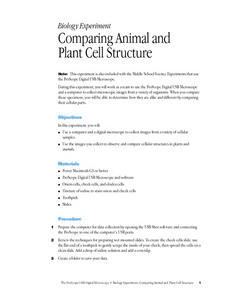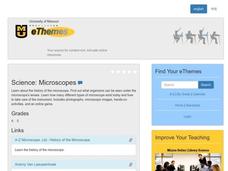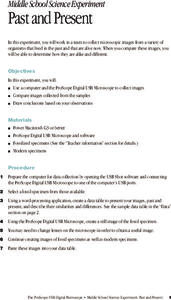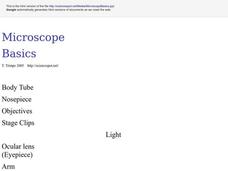Curated OER
The Microscope and Cell
In this science worksheet, students calculate the size of different samples using the microscope as part of a formal lab assignment.
Curated OER
Comparing Animal and Plant Cell Structure
Students work as a team to use the ProScope Digital USB Microscope and a computer to collect microscopic images from a variety of organisms. When they compare these specimens, they are able to determine how they are alike and different...
Curated OER
Microscopes
Students explore the history of the microscope. Find out what organisms can be seen under the microscope's lenses. explore how many different types of microscope exist today and how to take care of the instrument.
Curated OER
The Virtual Electron Microscope
Students explore the world of the very small using a Flash plug-in Virtual Electron Microscope. They complete and discuss an activity in which unknown samples are placed under the computer simulated microscope to determine where the...
Curated OER
Past and Present
Students compare fossilized specimens to contemporary specimens. They use a computer and a Proscope Digital USB Microscope to collect and compare images of ferns, sand dollars and sow bugs to those of similar fossilized samples.
Curated OER
Underneath the Microscope
Eighth graders enhance their skills in operating a microscope. They become comfortable with the vocabulary associated with microscopes and investigate how to place slides and focus them properly using the microscope. Students are given...
Curated OER
18th Century Microscope
Young scholars examine a microscope from the 18th century. In this microscope lesson, students investigate how it works, what it was used for and how the tool has evolved through the years. Young scholars also build knowledge on how...
Curated OER
Mineral Matters
Students work in a team to use the ProScope Digital USB Microscope and a computer to collect microscopic images from a variety of mineral specimens. They compare specimens and determine how they are alike and different by comparing their...
Curated OER
Cancer and the Cell Cycle - Biology Teaching Thesis
Identify the different stages of mitosis and what occurs in each stage with a straightforward biology lesson. Young scientists identify the importance of the cell cycle control in maintaining homeostasis, and then match the correct...
Curated OER
Time Lapse Seed Germination with the QX3 Intel Digital Microscope
Learners use the time-lapse feature of the QX3 Intel Digital Microscope
to observe germination of seeds. They use the QX3 Intel Digital microscope to create time lapse video films of seed germination experiments.
Curated OER
The Microscope
Students investigate the parts and functions of a compound microscope. They explore various websites, label the parts of a microscope on a worksheet, view prepared slides, and create drawings of the prepared slides.
Curated OER
Calculations Related to the Microscope
Learners examine microscopes and how to calculate total magnification. In this calculations activity students complete an activity of calculations.
Curated OER
Viewing Bacteria
Have you ever wanted to know the true structure of E.coli? Does the thought of peering into its "small world" sound exciting? Here is a lesson that allows pupils the ability to do just that. Blossoming microbiologists use...
University of Minnesota
Close-up of the Nervous System
Make sure your class gets on your nerves! Learners of all ages practice peering into the nervous system to see what's inside. Groups examine prepared slides of mammalian nervous system tissues, all while gaining microscope skills. The...
Teach Engineering
Imagining DNA Structure
Let's get a closer look at DNA and other molecular structures. The first lesson in the series of four introduces a variety of imagining techniques that engineers and scientists use to visualize molecular structures. The resource presents...
Curated OER
Mystery Powders
Middle schoolers collect microscopic images from a variety of chemical specimens to determine the identity of a mystery powder. They use a ProScope Digital USB Microscope to describe and compare the crystal size and shape of the chemicals.
Cornell University
Plant Cell Crime Scene
Use science to solve the mystery of the Poplar murder. Pupils use forensic botany to determine if a suspect could be the killer. By analyzing images from a Transmission Electron Microscope, learners determine if the material found on the...
Curated OER
Exploring Microscopes
Students explore the parts of a microscope. In this microscope lesson, students examine simple and compound microscopes. Students discover how the parts of a microscope work together to generate an image.
Curated OER
A Model of a Scanning Tunneling Microscope
Ninth graders explain how a scanning tunneling microscope works. In this chemistry activity, 9th graders construct atomic models and simulate how their images appear under the STM. They discuss the limitations of their atomic model.
Curated OER
Capturing Bacteria Growth
Students grow bacteria. In this bacteria growth instructional activity, students allow bacteris to incubate for 2-3 days. The teacher uses a document camera to show how to remove the bacteria from the plate. Students remove a small...
Curated OER
What Color is the Ocean?
Young scholars view satellite pictures of the ocean, and discuss the presence of phytoplankton and the colors of the ocean. Students compare/contrast ocean satellite images with maps and globes, then color world maps to replicate the...
Virginia Department of Education
The Cell Cycle and Mitosis
What a packed lesson! Provide your class with the opportunity to learn about the cell cycle in several exciting ways. Biologists first learn about the theory behind mitosis, then proceed to view onion tips under the microscope and create...
Curated OER
Microscope Basics
Students examine a microscope and learn its parts. In this microscope lesson students study the different parts of the microscope and see the differences in the adjustments then make their own wet slide.
Curated OER
Microscopes and Telescopes
Students analyze a microscope and study what they do. In this investigative instructional activity students study how microscopes were first invented, and how ray diagrams are used in conjunction.























